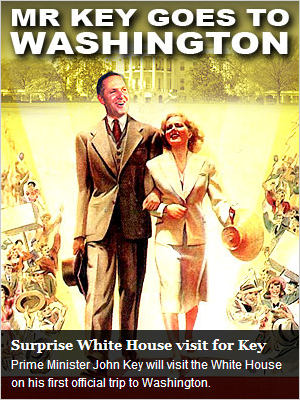 Sarah Palin, as has been clear for some years now, has an unmatched talent for drawing the spotlight. A week after the infamous ‘blood libel‘ video she’s still at it today, pouring more fuel on a fire which should never have been started. ‘Blood libel’ and the American Right’s shrieking, paranoid victim complex are now a bigger story than the (attempted) murder of Congresswoman Gabrielle Giffords and others at a political rally outside a suburban supermarket. That takes an awful lot of doing.
Sarah Palin, as has been clear for some years now, has an unmatched talent for drawing the spotlight. A week after the infamous ‘blood libel‘ video she’s still at it today, pouring more fuel on a fire which should never have been started. ‘Blood libel’ and the American Right’s shrieking, paranoid victim complex are now a bigger story than the (attempted) murder of Congresswoman Gabrielle Giffords and others at a political rally outside a suburban supermarket. That takes an awful lot of doing.
But she simply doesn’t know when to shut up. Let me be clear: I’m by no means saying that she must shut up, or even that I want her to shut up; nor am I attempting to curtail her First Amendment rights or impinge upon her cherished liberty — let there be no persecution fantasies regarding the humble analysis which is to follow. Palin’s conduct is a matter of political strategy for her PAC, the wider Tea Party movement and ultimately the Republican party. If they want to keep pursuing a strategy which, politically, is a hiding to nothing, then far be it from me to stand in their way. But I am arguing, as are plenty of Republican-oriented strategists, including former Bush advisor David Frum — that as a matter of strategy she should just shut the hell up and resume her place on the fringes of this topic, because there’s nothing to be gained and an awful lot to be lost by continuing to fan these flames. Frum is hardly a bleeding-heart liberal; he invented the ‘Axis of Evil’. He is also Jewish, as is Rep Giffords, so one assumes the misuse of ‘blood libel’ by a renegade WASP like Palin has special salience to him.
Let me also say that Palin and the Tea Party had some right to be angry at the invective levelled at them and their movement in the immediate aftermath of the Tucson shooting. I generally agree with Pablo’s previous points, that Palin and the Tea Party must bear some responsibility for the climate of discourse they have created; but I’d also say that they have not created such a climate on their own. While disproportionately on the elephant side, warlike imagery and symbols of political violence are a commonplace in both camps of US politics. Influential US liberal commentators, notably Keith Olbermann, jumped all too gleefully upon the chance to all but blame Palin (and Beck, etc) for pulling the trigger, although at best there is only a tenuous link between Jared Lee Loughner’s anti-government sentiments and the Tea Party. (Although it is often overlooked that Olbermann’s rant also called strongly upon the American left to repudiate (not refudiate) violence in word and deed). The extent of the speculation and the attempts to pin the murders on Palin and the Tea Party before the dust had settled were unmerited and, as I say, the objects of these accusations were justified in a certain amount of self-righteous indignation.
But one of the defining characteristics of the Tea Party, and of libertarian-oriented small-government revivalist movements in general, is their utter lack of perspective, and Palin simply went too far. These are people who genuinely believe taxation to be armed robbery, after all. So, like the white supremacist who blames all misfortune on immigrants; like the misogynist who bemoans the PC feminazi dykocracy; or the wealthy white elderly Sensible Sentencing Trust supporters who believe themselves to be the most vulnerable victims of crime, when, objectively, the reverse is true — the Tea Partiers and Palin simply can’t see past their own trivial victimisation to the actual and genuine victims of the Arizona tragedy, those who are dead, wounded or bereaved. IrishBill, writing at The Standard recently referred to these sorts as Right Whingers, and the persecution narrative is a feature of modern backlash movements: when elites come under such threat that they feel as if they no longer command the fields of cultural battle, they claim to have been victimised. And they go on and on about it. “Help, help, we’re being repressed!”
Nobody likes a whinger or someone who talks a big game but can’t play, especially in US politics. One of the Republican party’s strongest symbolic assets through the latter 20th century has been the sense that it’s a party of rugged individuals with the thousand-yard gaze of their pioneer forebears, while the Democrats are a bunch of preppy sissies with excuses always at the ready. To an extent there’s been some truth to this narrative, but the “all hat and no cattle” label attached to Bush did his party’s political fortunes considerable harm, and Palin has already weakened her own pioneer and Mama Grizzly credentials immeasurably with the now-infamous ‘hunting’ episode of Sarah Palin’s Alaska. In it, despite her claim to being a life-long hunter, she appears unfamiliar with her rifle (“does it kick?”), is unable to chamber her own rounds (daddy does it for her); and takes five shots to hit a large animal standing on a skyline 120 yards away (and then there’s the estimate that a hunting trip in her home state cost $42,000 — not very pioneerish, that).
Likewise, the emergence of the Tea Party and its rather more extreme rhetoric has seen the erosion of the traditional, conservative pioneer narrative in favour of a more excitable tone — perhaps a shift from ‘pioneer’ to ‘revolutionary’ would be the metaphorical change. This shift in itself is not a weakness, except when its less favourable characteristics come to the fore, and it is these aspects of the Tea Party movement which the Democrats and other liberals have been emphasising: its crazed extremes and frightening rhetoric; the cultish, heightened emotionality of leaders like Glenn Beck, which verges on the religious; its lack of concern with details like grammar, factual accuracy and proportion; its brittleness and temporary, ad-hoc nature as opposed to the reliable stability of the Grand Old Party.
By resort to the strident ‘blood libel’ line, Palin has fallen into the trap of confirming — and defending — key aspects of the liberal narrative about her and by extension about her movement: she lacks any sense of perspective or proportion, public decorum or decency or compassion; she is an attention-seeker with a persecution complex who thinks it’s always all about her; she doesn’t know what the terms she uses actually mean; that they’re desperate cranks rather than serious statespeople; and most seriously, that she can dish it out but not take it. This last will be the master narrative going into the 2012 Presidential election, in the increasingly unlikely event that Palin is the nominee, and Democrats and liberals the world over relish the prospect of a proven big-game player like Obama against a scattergun show-pony like Palin.
The decision to release and then defend the ‘blood libel’ video is a double tragedy for the Republican party, who took a strong lead in the November mid-terms, and have now missed the best opportunity in a decade to consolidate that lead by looking like the calm, sober, conservative adults they claim to be and to represent. Palin’s decline may be better for them in the long term; many commentators are now confirmed in the belief they held before the mid-terms that she had outlasted her usefulness as an energising agent, and is now simply a liability, a distraction from the serious business of government to which the GOP must now turn its attention.
L




